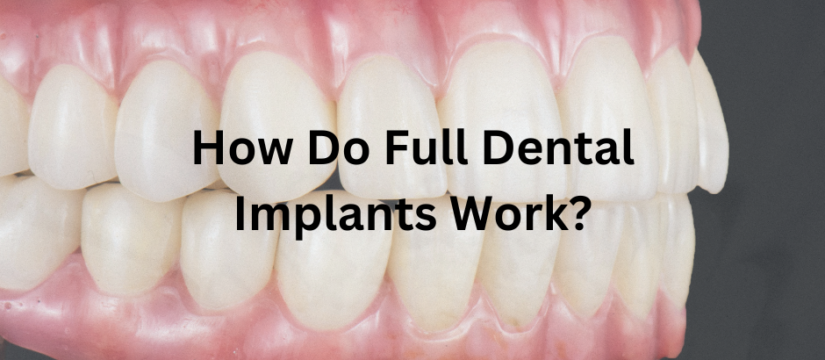
Struggling with the discomfort of traditional dentures? Fixed implant dentures provide a stable and permanent solution. In this guide, you’ll learn the benefits of fixed implant dentures, the process, and the care involved in transitioning to fixed implant dentures.
Key Takeaways
- Fixed implant dentures provide superior stability and comfort compared to traditional dentures, improving confidence and functionality.
- The All-on-4 and All-on-6 systems offer efficient solutions for replacing an entire arch of teeth with fewer implants, tailored to individual needs.
- Caring for fixed implant dentures is similar to natural teeth, requiring regular brushing, flossing, and dental visits to maintain hygiene and ensure longevity.
What Are Fixed Implant Dentures?
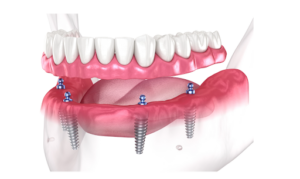
There are several types of fixed implant dentures, including the popular All-on-4, All-on-6, and 3 on 6 systems. These systems are designed to support an entire arch of prosthetic teeth using a minimal number of implants, maximizing both efficiency and comfort. The prosthetic teeth themselves are crafted to look and feel like natural teeth, providing the best solution and aesthetically pleasing solution. Several teeth are replaced with these innovative options.
The key component of these dentures is the titanium implant posts, which act as artificial tooth roots. These posts are surgically placed into the jawbone, where they fuse with the bone over time. This process, known as osseointegration, ensures that the dentures are securely anchored, providing a stable and permanent teeth solution for those with missing teeth.
Types of Fixed Implant Dentures
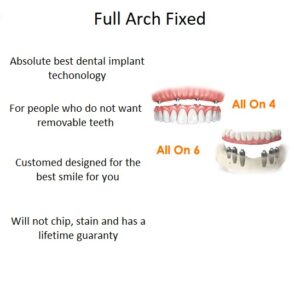
On the other hand, the All-on-6 system involves the placement of six dental implants, offering even greater stability and support. This method distributes the pressure more evenly across the implants, which can be particularly beneficial for individuals with higher biting forces. However, the All-on-6 procedure may require bone grafting to ensure there is sufficient bone density to support the additional implants.
Benefits of Fixed Implant Dentures
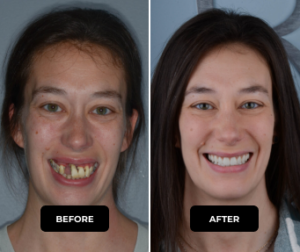
Another major advantage is the way these dentures mimic natural teeth roots, stimulating jawbone health and preventing bone loss. This helps maintain facial structure and prevents the sunken appearance that often accompanies severe tooth loss. The natural look and feel of fixed implant dentures also boost self-esteem, making patients smile more and encouraging smiles as they engage socially.
The long-term cost-effectiveness of fixed implant dentures cannot be overstated. While the initial investment may be higher than traditional dentures, their durability and lower maintenance costs make them a cost-effective choice over time. The quality of materials used in these dentures contributes to their longevity, ensuring that patients can enjoy their benefits for many years with minimal hassle.
Patients who transition to fixed implant dentures often experience a profound emotional uplift. For instance, one patient who faced extensive tooth loss regained their self-esteem and social confidence after undergoing implant treatment. Testimonials frequently highlight a renewed eagerness to engage socially, showcasing the profound emotional and psychological benefits linked to improved dental health.
The Process of Getting Fixed Implant Dentures
The journey to getting fixed implant dentures begins with an initial consultation to assess suitability. This involves a thorough evaluation of your oral health, including jawbone density and the condition of your gums. If you are a suitable candidate, the next step is the surgical procedure.
On the same day of the surgery, any remaining teeth are extracted, and the dental implants are surgically placed into the jawbone. This procedure is typically performed under local anesthesia, ensuring minimal discomfort. After the implants are placed, a healing period of three to six few months is necessary to allow the implants to integrate with the jawbone. During this time, you will wear a temporary healing denture.
Bone grafting may sometimes be required to improve jawbone density before implant placement. This step ensures that the implants have a solid foundation, increasing the likelihood of successful osseointegration. Once the implants have healed, a dental impression is taken to create a custom denture. This ensures that your final denture fits perfectly and looks natural.
The final step involves attaching the custom denture to the implants, completing the process. This final fitting ensures that the dentures are comfortable, functional, and aesthetically pleasing. Regular follow-up visits are essential to monitor the condition of both the attached dentures and the underlying implants, ensuring long-term success.
Who Should Consider Fixed Implant Dentures?
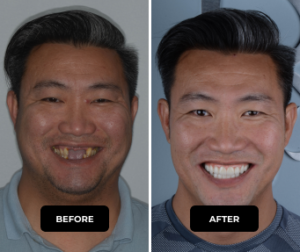
Healthy soft tissue around the mouth and gums is also necessary before considering implant dentures. Individuals with chronic conditions like diabetes or high blood pressure should manage their health before opting for implants. Commitment to maintaining good oral hygiene is essential for the longevity of implant-supported dentures.
Those who are missing most or all of their teeth, or who have significant tooth loss, should consider implant-supported dentures to replace missing teeth. These dentures are intended for edentulous people and those missing a few teeth, provided they have healthy bone and gum tissue.
Cost of Fixed Implant Dentures
The cost of fixed implant dentures can vary widely, typically ranging from $20,500 to $30,000 or higher, depending on the quality of materials and the location of the dental practice. Factors influencing the cost include the dental implant surgery itself, the materials used, and any additional procedures required, such as bone augmentation or extractions.
It’s important to note that insurance often does not cover the costs of implants since traditional dentures are considered a viable alternative. The complexity of each case, including the number of implants needed, also directly affects the total treatment cost. The cost of titanium implants is typically the most significant expense in fixed implant surgery.
Fixed Implant Dentures vs. Traditional Dentures
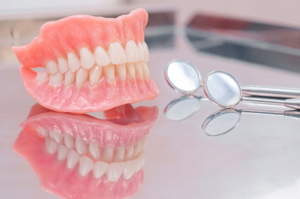
Traditional dentures often require regular maintenance and adjustments, whereas implant-supported dentures are more convenient and require less frequent upkeep. Additionally, the use of dental adhesives can enhance the stability of traditional dentures, but they still do not match the comfort and security of implants.
Overall, implant-supported dentures can significantly enhance quality of life by providing better stability, comfort, and confidence. Patients who switch to fixed implants often report improved stability in eating and speaking abilities, as well as a boost in self-esteem and social engagement. An implant supported denture can further improve these benefits.
Caring for Your Fixed Implant Dentures

Unlike traditional dentures, a hybrid denture does not need to be easily removed daily or soaked in water, as it is non removable and fixed in place. Replacing hybrid dentures helps to prevent plaque accumulation and potential gum disease. Routine dental visits are important for checking the condition of both the dentures and the underlying implants.
Specialized tools are available to help maintain the proper care and cleanliness of fixed implant-supported dentures, ensuring that they remain in good condition and function effectively.
Common Concerns and Solutions
Common concerns with fixed implant dentures include:
- Discomfort or soreness, especially if the dentures are not fitting properly.
- To alleviate soreness and irritation, it’s important to consult a dentist for adjustments and maintain proper oral hygiene.
- Regular consultations with a dentist can help address these issues and ensure that the dentures are properly adjusted for comfort and functionality.
Traditional dentures often cause issues like rocking, rubbing, and poor eating ability, which can lead to patient worry. Fixed implant dentures provide a more stable and comfortable solution, but it’s essential to address any concerns promptly to ensure a positive experience.
Real Patient Success Stories
Many patients experience high satisfaction rates when transitioning from traditional dentures to fixed implants. For instance, one patient reported a significant improvement in their quality of life, noting that they could eat and speak with newfound confidence. Another individual overcame severe dental anxiety through personalized support, transforming their perspective on dental visits and improving their treatment experience. Many patients find that fixed implants can effectively replace traditional dentures.
Support and reassurance from dental professionals can lead to positive experiences and encourage more individuals to pursue dental treatment. These success stories highlight the profound impact that fixed implant dentures can have on a person’s life, from improved functionality to enhanced self-confidence.
Summary
In summary, fixed implant dentures offer a stable, natural-looking solution for those with missing teeth. They provide enhanced comfort, improved chewing and speaking abilities, and long-term cost-effectiveness. The process of getting fixed implant dentures involves several steps, from initial consultation to final placement, ensuring a custom fit and optimal functionality.
For those considering fixed implant dentures, eligibility criteria include sufficient jawbone density and good oral health. While the cost may be higher than traditional dentures, the benefits and improved quality of life make them a worthwhile investment. If you’re ready to transform your smile and boost your self-confidence, fixed implant dentures could be the perfect solution.
Frequently Asked Questions
What are fixed implant dentures?
Fixed implant dentures are prosthetic restorations anchored by titanium implants in the jawbone, providing superior stability and a more natural look. This solution is ideal for those seeking long-lasting dental restoration options.
How much do fixed implant dentures cost?
Fixed implant dentures generally cost between $20,500 and $30,000 or more, influenced by material quality and dental practice location. It’s advisable to consult local providers for accurate estimates.
How long does the process of getting fixed implant dentures take?
The process of getting fixed implant dentures typically takes several months, including a healing period of three to six months for proper integration with the jawbone.
Who is a good candidate for fixed implant dentures?
A good candidate for fixed implant dentures is someone with adequate jawbone density, good oral health, and a dedication to maintaining oral hygiene. These factors ensure the success and longevity of the implant.
How do I care for my fixed implant dentures?
To care for your fixed implant dentures, brush them daily with a soft-bristled toothbrush, floss regularly, and maintain routine dental visits to keep both the dentures and underlying implants in optimal condition.

